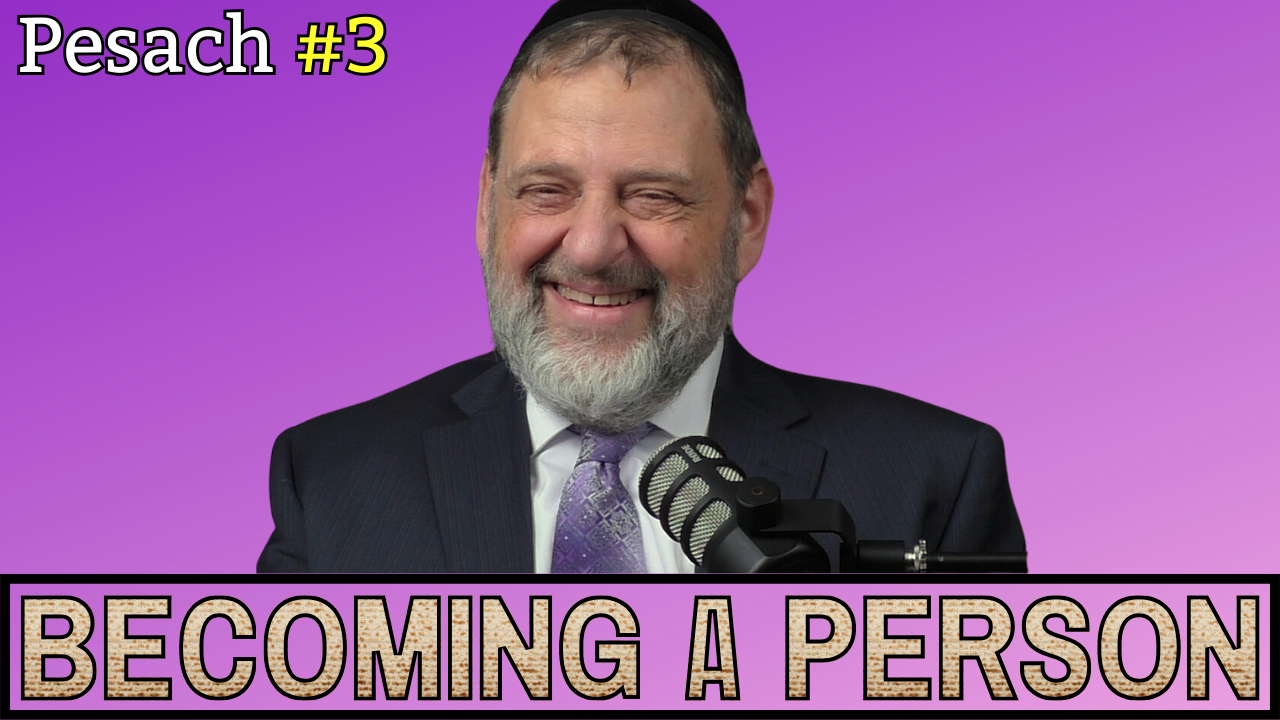The Four Sons Part 3 - the Rasha
/“What does the rasha say? “What is this avoda to you?” To you, and not to him. And since he has removed himself from the community, he is a denier of the essence of Judaism. Therefore you should “hakheh” his teeth and say to him, this is because of what Hashem did for me, when He took me out of Egypt. You, and not him. Had he been there, he would not have been redeemed.”
This seems to be a strange approach to take with a wicked son. Where are all the clever kiruv techniques they are teaching all over the world? Reach out to people, they tell us; care for them and show them you love them. Should we instead, as my father used to say, "Rap ‘em in the mouth"?! We're supposed to knock out their teeth and say, "Oh yeah? Well, if you were there you wouldn't have come out of Egypt anyway!"
Besides questioning the effectiveness of the method, I question the effectiveness of the response. The rasha says, "I don't believe in all this nonsense. I don't buy the whole story." And we say to him, "Then you wouldn't have come out of Egypt," - which he doesn't believe to begin with!
The Fifth Son
To understand the question of the rasha and the response, we have to understand that there is a fifth son. The fifth son is the one who doesn't even come to the Seder. The rasha, for some reason, wants to be at the Seder - he just doesn't want to follow the rules. He's like a fellow I once met who told me he wouldn't have a problem keeping Shabbos, if it weren't for all the laws. Now why would someone come to a religious event and not participate? If you don't want to be there, just don't come. Even a rasha can understand that it's not nice to come and make fun.
Many of the commentators are troubled by the fact that the rasha comes second in the list of sons. The Tam, the simple son may be limited intellectually, but that doesn't mean he can't be a good person. Why doesn't he come before the rasha in the list? The rasha is wicked so he deserves to come last. The explanation given is that a rasha is not merely someone who asks disrespectful questions. To be a rasha, you need to first be a chacham. I've mentioned in the past that that is why it is extremely difficult to find a rasha today.
“To be a rasha, you need to first be a chacham.”
When I was running a youth organization years ago, I would occasionally be accosted by a fourteen or fifteen-year-old who would tell me defiantly, "I'm an atheist." I would respond, "Have you ever studied classical philosophy? Do you know Socrates, Plato, Aristotle?" He admitted that he had not studied the classical philosophers. I moved up to medieval philosophy, then modern philosophy and then lehavdil, to Jewish philosophy. "I mean," I would explain, "people like Maimonides, Yehuda Halevi, or the Ramchal." He said that he had never read the works of any of them. "Have you ever read the Bible," I would finally ask? "The whole thing?" he would ask incredulously. One boy told me he had read a summary of the Old Testament. "Well then," I told him, "forgive me for saying so, but you're not an atheist - you're an ignoramus!"
How can a person claim to be an atheist when he hasn't even begun to research the question? He must realize that he isn't the first person to whom the question has occurred. Would he have the audacity to walk into a physics conference and offer an opinion on the theory of relativity without knowing what the theory is? Anyone who develops his theology on the back of a school bus while playing with baseball cards is not a rasha. He is just being fatuous.
A real rasha is a chacham. The reason he is mentioned next to the chacham is that if we can turn him around, he will be a chacham! He needs that potential to be considered and treated as a rasha; otherwise, he's just a she'aino yodea lishol, who, by the way, receives the same answer as the rasha. Ignorance and evil are closely related.
הקהה and הכה
The rasha asks, "Why are we doing this? Who needs it all?" He wants to eat already. Our response to him is hakheh es shinav (הקהה את שיניו), which is often mistranslated as "hit him in the teeth". That is incorrect: the word is הקהה, 'dull' (with a kuf, ק); not הכה, 'strike' (with a kaf, כ). It really means to dull his teeth, blunt them, or, as we would say in English, take the bite out of him.
The rasha says, in essence, that we don't need all this religious stuff: Let's just have a nice family meal together. A little matza, some gefilte fish, and, you know, the cute little traditions that our people have enjoyed for so long. Sort of like a Navajo Indian rain dance. But let's move it along. We don't want to sit here all night and listen to speeches. Our response is simple, and it instantly takes the bite out of him. We ask him, "Why are you here? Do you want to go out for dinner? Well, in two weeks we'll all get together and go out to dinner. But why did you come to a Seder?"
There is no better way to take the bite out of a Rasha than to point out that we Jews belong to something real. When I am accused of inflexibility where religion is concerned, I plead guilty. "What can I do?" I explain. I really believe in this. You know, G-d, the Torah, the halacha - I think it's all real. I and millions of Jews throughout history have been prepared to die for our beliefs. Jews don't get themselves killed themselves over borscht and kugel, for culture's sake, but for the word of Hashem, for the Truth. We would give up our very lives for this.
We may not have children who are reshaim, Baruch Hashem, but we do have children who display this quality at times. There is no better way to take the bite out of a rasha than to point out that us Jews belong to something that is real. Hashem, Torah, Halacha - it is all real, and I and tens of scores of Jews throughout history have been prepared to die for our beliefs.
“Jews don’t get themselves killed themselves over borscht and kugel”
Picking and choosing
"Why can't I pick and choose? Why can't I do what I feel like?" he asks. The answer is because Judaism is real. It is not just a collection of ancient traditions and gastronomical experiences. It's all true. And we need to impress upon our children the sense of mission that is inherent to our way of life.
When we do things, our children have to learn that there is a system. We Jews don't pick and choose the right thing to do. If we go to work in a blizzard, but can't make it to minyan, what message are we sending our children? If we don't sing zemiros at our Shabbos table or walk out in shul during the devar Torah, then we are picking and choosing.
Among the previous generation there were many Jews who abandoned Shabbos and kashrus, and then were shocked when their children intermarried. They wondered why their children did not know what was really important. They were upset that their children could not figure out which things to keep and which to toss aside. Perhaps those parents should have given more thought to what they were telling their children at their Pesach Seder.
We Jews don't pick and choose the right thing to do. If we go to work in a blizzard, but can't make it to minyan, what message are we sending our children?
“If we go to work in a blizzard, but can’t make it to minyan, what message are we sending our children?”
A Matter of Priority
Next week, all around the world, nice Jewish families will move out of the simple task of Pesach preparations and move into Pesach insane mode. Over the past few weeks, helpful husbands and determined housewives drew up the family's Pesach battle plans, complete with time charts and diagrams for the room by room assault. The week before Pesach however is based more on the Yiddish expression mon tracht un Gut lacht, people can plan all they want, but HaKadosh Boruch Hu has the last laugh.
It is not, obviously, a coincidence that every year we end up going crazy with preparations until the last minute. We are supposed to see ourselves at the Seder as though we ourselves came out of Egypt. There is no better way to experience that than to first go through a period of avodas porach, back breaking work. So people may have felt till now that they could take their time, spending a disproportionate amount of their time refolding every object in the linen closet until they sit on the shelf with mathematical precision. Cleaning out one's bedroom shelves must include rereading all old correspondence. But now the realization finally dawns - we have one week left to Pesach! Now is the time for panic.
As I have stressed throughout, that sense of nervous excitement must permeate our preparations for the mitzva of לספר ביציאת מצרים as well. We must never lose the עיקר for the טפל.
[This article originally appeared on Chazaq.org]
Illustrations adapted from the Katz Haggadah © 2017 Rabbi Baruch Chait & Gadi Pollack. May not be reproduced in any form. Used with permission.
The Fours Sons Series
This series is available as an ebook










